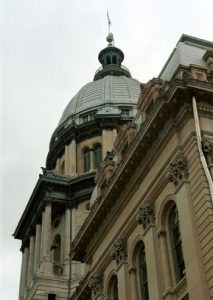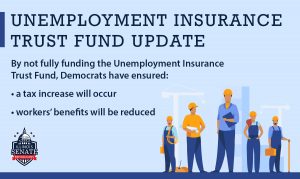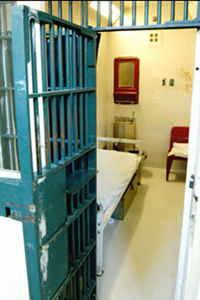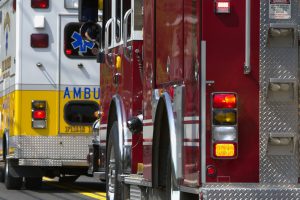 SPRINGFIELD – An ill-advised plan addressing Illinois’ unemployment insurance debt, forced through this week by Senate and House Democrats, lays the burden of state government’s fiscal irresponsibility at the feet of employers and will most likely guarantee higher taxes and cuts in benefits to workers.
SPRINGFIELD – An ill-advised plan addressing Illinois’ unemployment insurance debt, forced through this week by Senate and House Democrats, lays the burden of state government’s fiscal irresponsibility at the feet of employers and will most likely guarantee higher taxes and cuts in benefits to workers.
With gasoline prices at the pump well over $4 per gallon and projected to top $5 per gallon, State Sen. Dave Syverson (R-Cherry Valley) introduced a plan two weeks ago to cap the state sales tax on gasoline at the pump. Motorists can check out a calculator on Syverson’s legislative Web site at https://senatordavesyverson.com/ (top right panel) to see the expected cost savings from just this one simple change.
In other legislative news, March 22 was the first day Senate Committees met wholly in person in Springfield, without a Zoom option, since the COVID-19 pandemic shut down the state in March 2020. Lawmakers worked long hours in the Capitol during the week to meet the March 25 deadline of moving House Bills out of Senate Committees.
Also during the week, several Senate Democrat lawmakers finally joined with Senate Republicans to shut down one of Gov. JB Pritzker’s controversial appointees to the Prisoner Review Board (PRB). Many of the PRB appointees have been serving in official capacities for years without being approved by the Senate, as required by the Illinois Constitution.
And on March 23, legislators and fire officials called for the passage of legislation to help alleviate a critical shortage of volunteer firefighters and Emergency Medical Services (EMS) workers in Illinois.
Democrats’ irresponsible unemployment debt plan a tax on jobs
 Syverson says Democrat lawmakers continue to shirk their fiscal responsibilities by not fully paying Illinois’ $4.5 billion unemployment insurance (UI) trust fund deficit.
Syverson says Democrat lawmakers continue to shirk their fiscal responsibilities by not fully paying Illinois’ $4.5 billion unemployment insurance (UI) trust fund deficit.
Approved this week along partisan lines, the Majority Party’s plan includes a partial payment of $2.7 billion for the UI debt, which is short $1.8 billion needed to balance out the Fund. Syverson says with a negative balance, employers and workers who suffered through Pritzker-ordered shutdowns for so many months will end up being the ones who have to pick up the slack, with what could become the largest tax increase on Illinois’ employers in history.
Syverson says lawmakers should have used the billions of federal COVID-19 relief money to fully pay its unemployment trust fund debt, similar to how most states spent the money. Instead, the Majority Party prioritized the funds on pet projects and other one-time expenses. Currently, Illinois is one of only nine states to have an unemployment insurance deficit and, even after the $2.7 billion allocation, has the fourth largest debt in the country.
See how much you would save if state sales tax on gas is capped!
 Syverson and State Sen. Donald DeWitte (R-St. Charles) joined stakeholders during a press conference at the Capitol on March 10 to call on the General Assembly and the Pritzker Administration to immediately cap the state’s sales tax on motor fuel at 18 cents per gallon, which is what consumers were paying last fall before prices started to climb dramatically.
Syverson and State Sen. Donald DeWitte (R-St. Charles) joined stakeholders during a press conference at the Capitol on March 10 to call on the General Assembly and the Pritzker Administration to immediately cap the state’s sales tax on motor fuel at 18 cents per gallon, which is what consumers were paying last fall before prices started to climb dramatically.
“With gas prices continuing to skyrocket, we could easily see the average price of gas to be around five dollars per gallon. We would be providing relief at the pump now, and then preventing any future sales tax increase. We must pass emergency relief legislation before we leave this spring session,” Syverson said. “The government has no business capitalizing on a crisis at the expense of struggling families across the state. Money is always better left in the pockets of taxpayers who know how to spend their money better than government does.”
Under the Senators’ proposal, Illinois consumers could expect to save nearly $1 billion over the next fiscal year, or 16 cents per gallon, assuming gas prices are at $5.50 per gallon. Additionally, the measure would continue to provide adequate funding for Illinois’ infrastructure projects.
Syverson says Illinois is one of just seven states that in addition to the motor fuel tax also charges a sales tax at both the state and local level. The motor fuel tax is a flat tax not changed by fuel prices. Those dollars, by law, all go to fixing state and local roads. The proposed change is not changing the motor fuel tax or impacting funding for needed road work.
However, the state sales tax increases as the price of fuel goes up, and those dollars go back to government coffers. It is the state sales tax that would be capped under the Senators’ proposal. Senate Bill 4195 could mean savings to Illinois consumers of nearly $1 billion over the next fiscal year if gas prices do reach $5.50 per gallon.
Senate rejects Governor’s PRB appointee
 Gov. Pritzker received a major blow this week when his Democratic legislative allies joined Republicans to address the serious issues surrounding the Prisoner Review Board, which is charged with determining parole for some of the state’s most violent criminals.
Gov. Pritzker received a major blow this week when his Democratic legislative allies joined Republicans to address the serious issues surrounding the Prisoner Review Board, which is charged with determining parole for some of the state’s most violent criminals.
On March 22, after nearly a year of calls from Senate Republicans, the Senate Executive Appointments Committee took up six of Pritzker’s unconfirmed Prisoner Review Board (PRB) appointees; however, only one appointee was presented before the full Senate this week.
PRB appointee Jeff Mears was voted down by a 22-19 vote. He needed 30 affirmative votes for confirmation. Eighteen Democrats sat out the vote. Following the vote, Senate Democrats said their intent on Monday, March 28, was to take up some of the remaining unconfirmed appointees—two of which are the most controversial members on the board and will reach their deadline for confirmation on Monday, March 28.
Currently, only eight board members remain—five of whom have so far escaped the Constitutionally-required confirmation process.
The Illinois Constitution requires that appointees be confirmed by the Senate within 60 session days. Pritzker has often pulled his appointments right before the deadline, just to turn around and reappoint them to reset the 60-day clock—intentionally skirting the process outlined in the Constitution.
Addressing shortage of volunteer emergency workers
 A bipartisan group of legislators joined the Illinois Firefighters Association officials at the Capitol March 23 to call for the passage of legislation to help alleviate the critical shortage of volunteer fire and EMS workers in Illinois.
A bipartisan group of legislators joined the Illinois Firefighters Association officials at the Capitol March 23 to call for the passage of legislation to help alleviate the critical shortage of volunteer fire and EMS workers in Illinois.
Modeled after legislation passed in New York, Senate Bill 3027 would provide a $500 state income tax credit for volunteer emergency workers who earn less than $10,000 in stipends for their service to the fire department.
“Volunteer firefighters, paramedics and EMS workers put their lives on the line each and every day for the safety of their fellow Illinoisans. Providing a state income tax credit for these emergency workers is one way to thank them,” Syverson said. “Seventy percent of Illinois is covered by volunteer fire departments. With the number of volunteer emergency workers declining, this income tax credit could also be an incentive for other residents who have considered lending their time and talents to this very noble cause.”
Cosponsored by Syverson, Senate Bill 3027 passed the Senate by a unanimous vote on Feb. 23, but a vote has been put off in the House of Representatives.
“There is a public safety crisis going on throughout the state, with the number of emergency calls to fire departments tripling (the majority of which are for EMS) and the number of volunteer emergency workers plummeting. This reflects a nationwide shortage of volunteers, contributing factors which include: the aging population of volunteers, increased training requirements, and newer policies, which prohibit full-time firefighters from volunteering in their own communities,” explained Highland Fire Chief Kerry Federer.
“The message we want to get out today is two-fold: first there is a dire need for this legislation to pass; and secondly, we want to encourage people to consider becoming a volunteer fire or EMS worker and make a major difference in the lives of their community. Not all departments are totally volunteer, and some compensate per call while others provide stipends or reimbursement for expenses,” explained Illinois Firefighters Association Legislative Chair Kevin Schott.
Founded in 1889, The Illinois Firefighters Association (IFA) is dedicated to the advancement of the Fire Service by providing leadership through education, training, benefits, and information networking at the local, state, and national levels.

